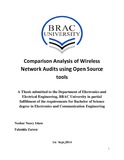Comparison analysis of wireless network audits using open source tools
Abstract
Wi-Fi, also spelled Wifi or WiFi, is a popular technology that allows an electronic device to exchange data or connect to the internet wirelessly using radio waves. WiFi has a lot of advantages, they are easy to set up and inexpensive. They're also unobtrusive. At the same time, a well-designed and secure installation of a WiFi network is not a trivial task. Many companies therefore need professional help to audit their WiFi deployments or pilots, and ensure that their use of this new technology is not done at the expense of security and performance. Many tools exist to enable security professionals to do Wi-Fi networks surveys, ranging from "Free" Open source tools, to sophisticated commercial products. Nowadays most of our industries are using wireless networks for communications, and security is a big issue here. But it has been seen that most of the industries do not monitor or audit their network, as the trend is that open source tools are not for professional purpose. And the professional and commercial audit tools are expensive for some of the industries in our country. But there are some of the open source tools for detecting, monitoring and penetrating which are very efficient, for example Wi-Fi networks are Kismet, NetStumbler ,Wireshark , WiFiFoFum , Aircrack and many more. The intention of this thesis is to do a comparison analysis of the top most open source audit tools and map them according to different industries of our country. The comparison analysis was done by practically installing the tools and using the tools to audit networks at different sites and then mapping the features to the requirements of the most popular sectors of industries of our country.

